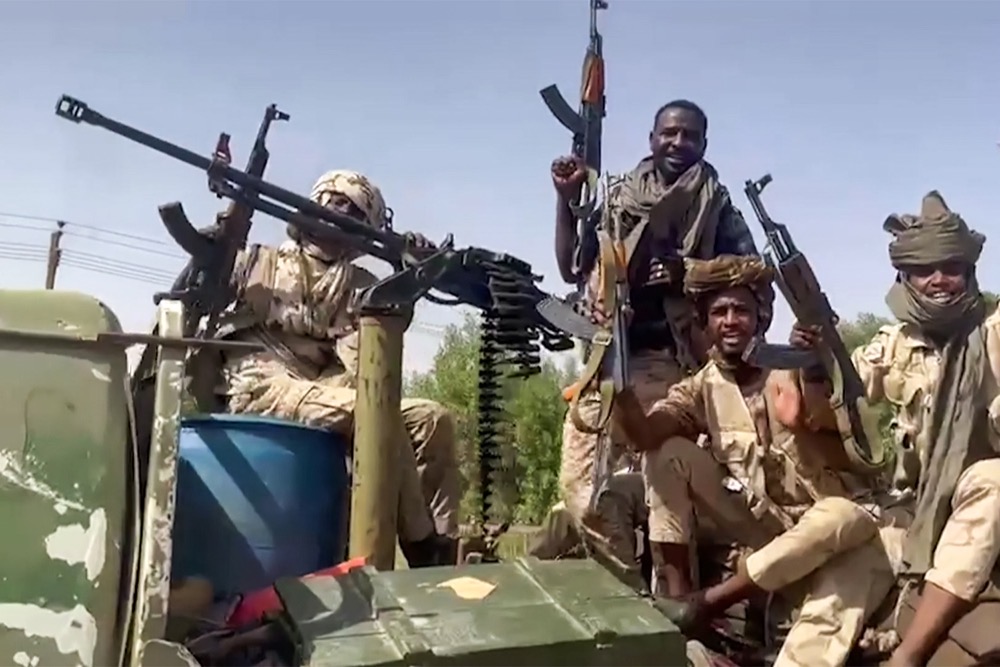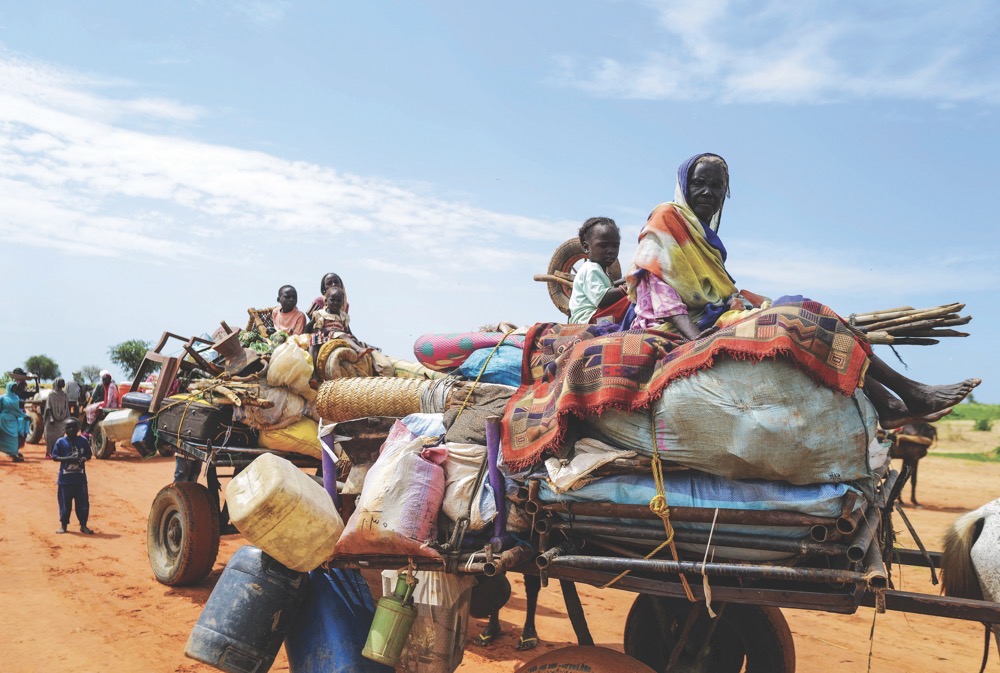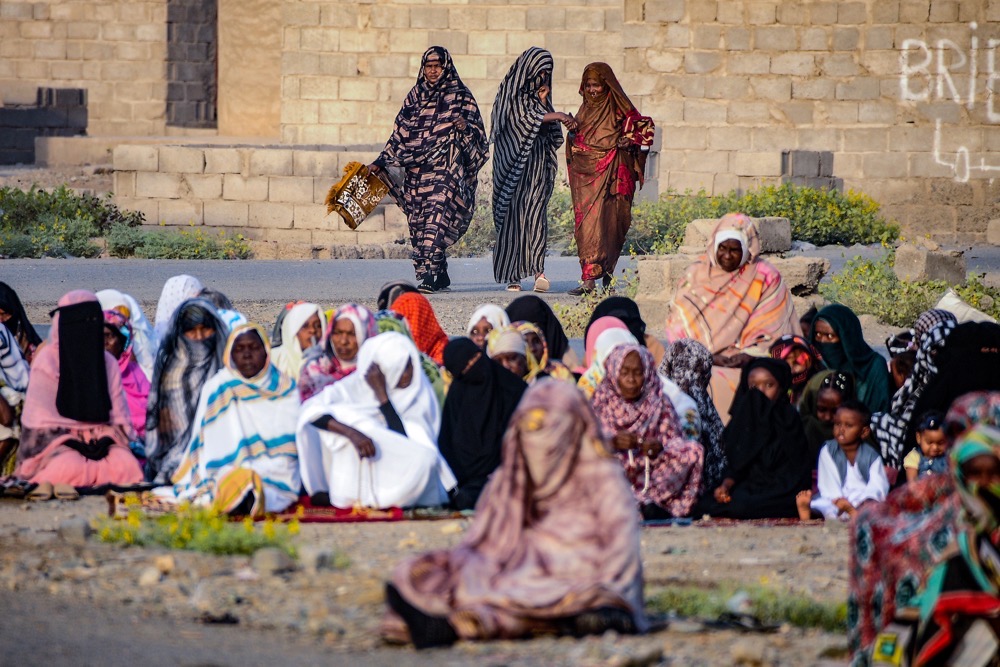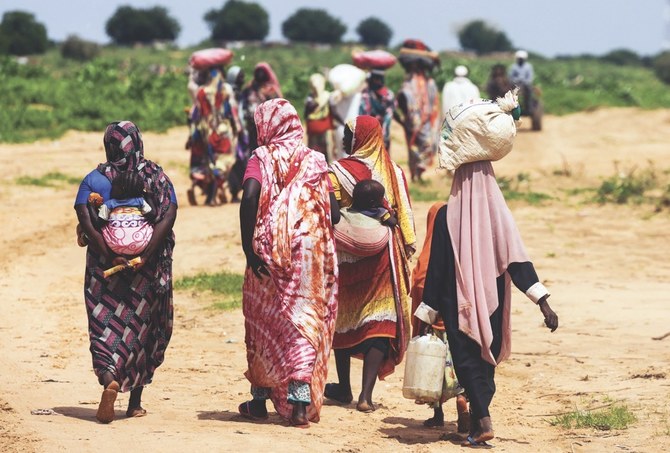JUBA, South Sudan: As the conflict in Sudan between the Sudanese Armed Forces and paramilitary Rapid Support Forces persists, a crisis of gender-based violence has emerged, with women and girls at risk of rape, trafficking and early marriage.
Even before the fighting erupted on April 15, more than 3 million women and girls were already vulnerable to gender-based violence. The number has now surged to 4.2 million, according to the UN, reflecting the devastating impact of the conflict on civilians.
One 37-year-old survivor, who spoke to Arab News on condition of anonymity, said she was displaced to North Darfur after her village was attacked by RSF fighters in June. She said her husband and several friends and relatives were killed.
In her harrowing account, she says she and others were rounded up by the attackers before the men were separated and subjected to brutal beatings. “I fled, having been sexually violated by one of the fighters, and left my children behind,” she told Arab News.
“As a displaced person, my life has become a constant struggle for survival. The harsh realities of being uprooted from my home, separated from loved ones and living in uncertainty weigh heavily on my shoulders. Each day I battle for food, clean water, and shelter for myself and other fellow displaced individuals.
“The fear of being sexually abused again never leaves me. It’s a constant worry, making me anxious and distrustful of strangers. I try to stay safe, but the memories keep haunting me, and it’s hard to trust anyone.”
Another woman from El-Geneina in West Darfur, who also asked not to be identified, says she witnessed the burning, killing, torture and rape of innocent civilians when fighters attacked her community in May.

Rapid Support Forces fighters ride on a militarized pickup truck in the East Nile district of greater Khartoum. (AFP/File)
“As a mother of six, I cannot bear the weight of witnessing such unimaginable atrocities without seeking justice for the innocent lives lost,” she told Arab News.
“We may have lost loved ones, homes and our sense of security, but our determination to seek justice remains. I speak not just for myself but for every innocent soul who fell victim to the brutality.”
She hopes that sharing her testimony will serve as a catalyst for “justice and accountability for the war crimes committed by the perpetrators.”
A new report published by Amnesty International on Thursday details multiple cases of sexual violence against women and girls, targeted attacks on civilian infrastructure such as hospitals and churches, and extensive looting.
The human rights monitor said that several of the violations documented in the report amount to war crimes.

“Scores of women and girls, some as young as 12, have been raped and subjected to other forms of sexual violence by members of the warring sides. Nowhere is safe,” Agnes Callamard, Amnesty International’s secretary-general, said in a statement.
“The RSF and SAF, as well as their affiliated armed groups, must end their targeting of civilians and guarantee safe passage for those seeking safety. Urgent steps must be taken to ensure justice and reparations for victims and survivors.”
The UN Human Rights Office in Sudan says it has received credible reports of 21 incidents of conflict-related sexual violence, affecting at least 57 people, including 10 girls. In one single incident, up to 20 women were reportedly raped.
The Sudanese government’s own Combating Violence Against Women Unit has documented at least 42 alleged cases in the capital, Khartoum, and 46 in the Darfur region.
However, it is widely acknowledged that the actual number of cases is likely far higher, owing to significant underreporting caused by shame, stigma and fear of retaliation.
Compounding the issue, the lack of electricity, connectivity, and humanitarian access due to the security situation makes reporting and seeking support for survivors exceptionally difficult, if not impossible.

The risk of gender-based violence is especially high when women and girls are on the move seeking safer locations while enduring severe economic privation. (AFP)
Attacks on health facilities have further exacerbated the situation, preventing survivors from accessing emergency health care.
Health providers, social workers, counselors and community-based protection networks in Sudan have all reported a sharp increase in gender-based violence cases against the backdrop of the conflict.
Women who were refugees in Sudan even before the latest conflict have reported violence when fleeing to new areas.
Aid agencies say urgent assistance is required at reception sites for internally displaced people in Sudan’s conflict-affected regions and neighboring countries.
FASTFACTS
• Gender-based violence (GBV) refers to all forms of violence directed against a woman or a man because of their gender.
• Scores of women and girls, some as young as 12, have been subjected to sexual violence, including rape, by the warring sides.
• In most cases documented by Amnesty International, survivors said the perpetrators were RSF members or from allied militias.
• Rape, sexual slavery and other forms of sexual violence committed in the context of an armed conflict are war crimes.
Before the latest conflict, Sudan had already been grappling with a longstanding issue of sexual violence that extended beyond the borders of the troubled Darfur region.
However, the fighting has exacerbated the situation, plunging survivors into an even deeper sense of hopelessness amid the prevailing lawlessness.
In a recent testimony, five women belonging to the Beja and Al-Bani Amer tribes who were attacked by RSF fighters in the eastern city of Port Sudan in 2020 continue to live in fear due to the lack of accountability.
They endured “unspeakable trauma,” according to a local journalist who spoke to them. One of the women was even forced to undergo an abortion as a consequence of the appalling attack.
The fear of societal stigma looms large, leaving survivors paralyzed with apprehension about potential repercussions from their own relatives.

The absence of justice and accountability that stretches over generations only worsens the situation for survivors, leaving them with little hope of redress.
Providing psychological support amid the challenging circumstances in Sudan sheds light on “the urgency of addressing this humanitarian crisis,” Selma Kamel Osman, a clinical psychologist from Khartoum, told Arab News.
With a lack of justice and widespread violence, “it is challenging to help survivors cope with their trauma and seek necessary medical attention,” she added.
Having served as a medical adviser since the beginning of the conflict, Osman has been helping people cope with symptoms of anxiety.
When cases of sexual assault arose, she started counseling through social media platforms, as it proved a safer way for people to discuss sensitive topics amid the prevailing stigma.
Osman has encouraged women to speak up and seek help, while also offering assistance to survivors of sexual assault.

The volatile political situation in Sudan leaves the international community with limited tools to intervene on the ground. (AFP)
Despite the difficulties, Osman has provided support to eight survivors of sexual violence who were attacked within looted houses in Khartoum.
“One case, however, happened in the streets,” she said, emphasizing that sexual violence is not specific to any tribe or race, and that it affects Sudanese women of all different ages and backgrounds.
For survivors of sexual violence, timely access to health services can be life-saving. Activists in Sudan are calling for donors to provide more medical supplies, dignity kits and post-exposure prophylaxis kits to prevent HIV transmission.
Ensuring that these items reach local clinics, community-based organizations and front-line responders is critical when survivors cannot access health facilities.
“Resources are very limited, and not all victims had access to HIV and pregnancy testing,” Osman told Arab News.
“However, ‘The Emergency Room,’ an online platform, provides medical advice and protocols to address potential sexually transmitted infections or pregnancies,” she added.
The volatile political situation in Sudan leaves the international community with limited tools to intervene on the ground as the warring parties have demanded non-intervention in their internal affairs.

A new report published by Amnesty International on Thursday details multiple cases of sexual violence against women and girls. (AFP)
However, on Aug. 1, in an urgent bid to confront the escalating crisis of sexual violence in Sudan, Pramila Patten, the UN special representative of the secretary-general on sexual violence in conflict, held a meeting with Maj. Gen. Abdul-Rahim Dagalo, deputy commander of the RSF.
The meeting came as part of the UN Security Council’s mandate to engage with all parties involved in armed conflict.
Patten addressed the concerning rise in sexual violence in both Khartoum and Darfur, and raised pressing issues such as the targeted attacks on medical facilities and personnel, the abduction of women and girls, and reports of slave markets in Darfur.
She said that both the SAF and RSF have been listed as parties suspected of committing or being responsible for patterns of rape or sexual violence since 2017, and called for command orders that demonstrate zero tolerance for sexual violence as part of military discipline.
Osman told Arab News: “The situation calls for broader international intervention and accountability to bring an end to the ongoing atrocities and to provide a path toward justice for the victims.
“Holding perpetrators accountable and amplifying the voices of survivors can pave the way toward a Sudan free from fear and trauma.”


























